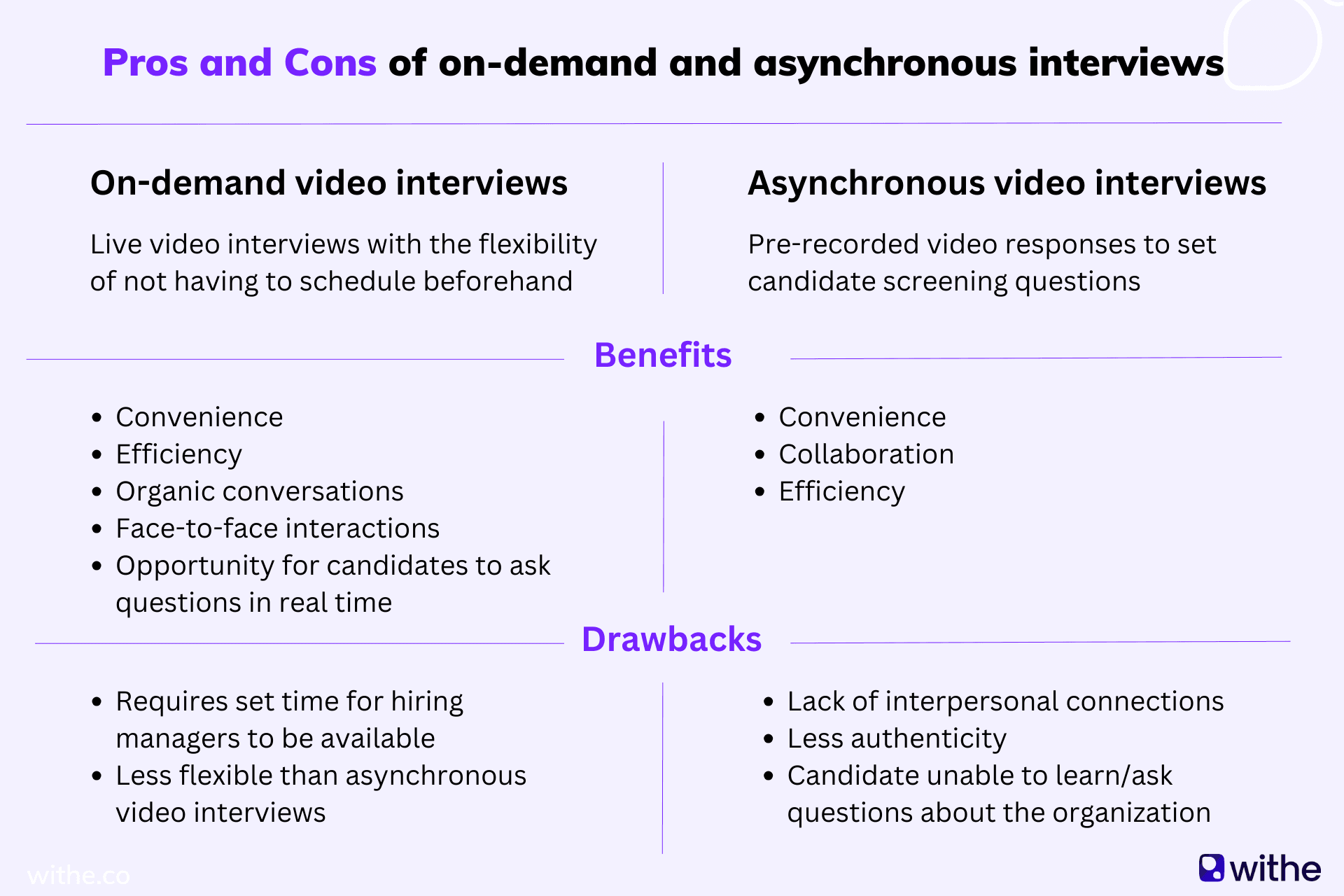Leverage Withe's hiring event platform
Streamline your seasonal and high-volume hiring process and hit your hiring targets.
The recruitment space is changing — a lot — and there are many factors influencing this shift.
Factors like the candidate experience, which has become a looming priority for many recruiters. Prospective employees are more exacting in what they expect from recruiters and employers, prompting organizations to build and invest in their employer brand.
Another key factor is the digitization of the space. Recruiters are being asked to move faster and more efficiently, and are leveraging tools and automations to help them do so. Two digital processes that are particularly popular are asynchronous interview responses and on-demand video interviews — but what do they look like in practice?
In this piece, we’re taking a closer look at on-demand and asynchronous interviews, as well as their differences and benefits, so that you can decide which approach makes the most sense for your team.
Leverage Withe's hiring event platform
Streamline your seasonal and high-volume hiring process and hit your hiring targets.
But first: Are on-demand interviews and asynchronous interviews the same thing?
Short answer: no, they’re not.
While “on-demand interviews” and “asynchronous interviews” are often used as interchangeable terms, we believe they speak to two different things.
The term “interview” is defined as an exchange or conversation between two parties, often conducted face-to-face. As such, by definition, an asynchronous interview describes a situation where the conversation doesn’t take place in real time. Instead, a candidate submits their video responses to a specific set of questions that recruiters then view and evaluate on their own time.
On-demand interviews, meanwhile, leverage video interview software to quickly have face-to-face conversations between recruiters and candidates. These near instant connections happen in real time and facilitate organic conversations.
With that out of the way, let’s get into the details.
What is an on-demand interview?
An on-demand video interview is a virtual conversation between a candidate and a recruiter leveraging video chat software, without the hassle of scheduling. While these interviews can be scheduled, they provide greater flexibility and are often used at scale in volume hiring events where multiple interviewers are available to speak with multiple candidates at the same time.
In the hospitality industry, for instance, this is a particularly useful tool for volume hiring events where hundreds of candidates are screened during a specific time slot. Here, candidates can participate in virtual interviews they scheduled beforehand, or join the event and be put in a short queue to be interviewed. In this way, the candidate is being interviewed by recruiters who benefit from having face-to-face interactions with their candidates.
Related resource: How to implement video interviews in your volume hiring process
What are the benefits of on-demand video interviews?
On-demand video interviews provide a lot of the same benefits as pre-recorded responses, like convenience and efficiency, while still allowing for conversations between candidates and recruiters. On-demand videos make it easier to:
- Keep the humanity in recruitment. Candidates want to talk to real people and an on-demand video interview gives them the opportunity to learn more about the organization they’re applying to from someone who knows about it.
- Interview at scale. On-demand video interviews supported by scheduling and queue management systems are ideal for volume hiring events held by the hospitality industry and more.
- Assess verbal and non-verbal communication skills. A real-time interview where the candidate is responding to questions live is key for understanding how they act in a professional setting and how they communicate (semi) organically with others.
- Get in front of candidates early. It’s a very competitive hiring market at the moment and often a conversation or real life interaction can go a long way to making a positive impression with a candidate.
- Reduce time to fill. 43% of candidates drop-off at the apply stage, never making it in-front of a hiring manager. On-demand interviews increase the candidate top-of-funnel.
Where on-demand interviews can fall short for recruitment teams is that they require hiring managers to be available at a specific time and are ultimately a less flexible approach for candidates than asynchronous interviews.
What is an asynchronous interview?
An asynchronous or pre-recorded video interview is a process in which recruiters send questions to candidates that they can then respond to via recorded video in their own time. Generally used as a screening tool before an in-person or live video interview, asynchronous interviews are typically conducted using specified software. The recruiter uses this software to set up the questions, set a time limit on the responses, and then review each candidate’s submissions.
What are the benefits of asynchronous interviews?
Today, many recruiting teams are being asked to do more with less. They’re often understaffed and are tasked with filling growing gaps across other departments. For them, the benefits of asynchronous interviews include:
- Convenience: They can review pre-recorded video responses in specific time blocks without having to spend time scheduling calls with candidates. Plus, candidates can also record their answers at a time that works best for them — and not while they take their lunch break at their current job.
- Collaboration: With pre-recorded videos, recruiters can share the responses with other stakeholders and hiring managers to get their input.
- Efficiency: Asynchronous interviews are more succinct and reduce the time recruiters spend screening each candidate.
While these are all useful benefits in the current recruitment landscape, this process also comes with its drawbacks. For starters, asynchronous interviews aren’t conversations. This means recruiters can’t evaluate interpersonal skills (which are key for roles in sales or hospitality) and can’t review body language or nonverbal cues in response to certain questions.
In a similar vein, pre-recorded interviews aren’t always authentic. Depending on the process, the candidate may be able to rehearse their answers and provide scripted responses that they think recruiters want to hear. There’s also no opportunity for an organic conversation where the recruiter follows up on certain answers or the candidate offers up anecdotes.
Lastly, asynchronous interviews rarely offer the chance for candidates to ask questions of the employer. This means they can’t get a read of the company during the screening process — and that could encourage them to pursue other opportunities where they get the chance to build an early relationship with the recruiter.

Which approach should you use?
When it comes to deciding which of these methods makes the most sense for your team, there are a number of things to consider:
- The industry and type of role you’re hiring for
- The skills you need to assess
- The scale of the hiring process
- How competitive the market is
These are important factors that might point to one approach over the other.
At the end of the day, recruiting is an inherently human process, so it’s important that we don’t lose that humanity as we evolve and digitize these interactions. Regardless of which method speaks to you, however, it’s vital to invest in tools that are reliable and easy to use for both candidates and recruiters alike. Choose a technology that won’t impede individuals with poor digital skills, that will invite candidates into the process and engage them as they evaluate your company, and that will help bolster your employer brand.
Need a reliable on-demand video interview solution for your next hiring event? Withe can help.




